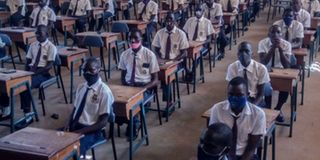Prime
Rethink USE to improve quality of education

What you need to know:
The issue:
USE performance.
Our view:
We appeal to government to address the issue of inadequate teaching materials, shortage of teachers, and late disbursement of funds.
On Thursday, the Uganda National Examinations Board (Uneb) released the 2022 Uganda Certificate of Education (UCE) results. Of the 345,695 candidates who sat for the examinations, a total of 15,756 failed and are expected to repeat Senior Four if they wish to proceed to Senior Five.
A total of 46,667 passed in Division One, 76,745 in Division Two, 88,690 in Division Three and 117,837 passed in Division Four.
“Worth noting is that performance in Physics and Chemistry has improved, although the overall pass levels are still low. More than 40 percent of the candidates have not passed the two subjects,” said Mr Dan Odongo, Uneb’s executive director.
According the Ministry of Education, Nakapiripirit emerged the worst performing district in the UCE exams. Other districts that performed poorly included Yumbe, Kween, Ntotoko, Obongi, Bukwo, Terego, Madi Okolo and Nabilakuk, which all had one percent of candidates in Division One.
The eight districts had 73 candidates with Division One out of the 6,152 candidates who registered for UCE.
This newspaper sampled some of the Universal Secondary Education seed schools and the performance was less than satisfactory. In one of the districts in western Uganda, for example, of the 65 candidates who sat for Senior Four, two passed in Division One, seven in Division Two, 17 in Division Three and 49 in Division Four.
The school authorities blamed the poor performance on lack of equipment in the laboratories. They said for the practical exams, they had to borrowed apparatus from other schools after the district failed to give them their own apparatus.
Other schools complained of lack of teachers since those on the government pay roll where few. Many teachers were paid an allowance using money collected by parents.
In some secondary schools, the issue of high drop outs was noted. This is because, despite some schools receiving funding from government under the USE arrangement, they go ahead to charge exorbitant fees in the name of requirements.
For some schools, the teachers where too demotivated to give the students full attention. This challenged became even more pronounced last year after government increased the salaries of Science teachers, promising those teaching Arts that they would be considered when the economy improved. This has prompted some teachers to concentrate on other ventures to make ends meet.
We appeal to government to address the issue of inadequate teaching materials, shortage of teachers, and late disbursement of government funds to improve performance in the USE schools.




